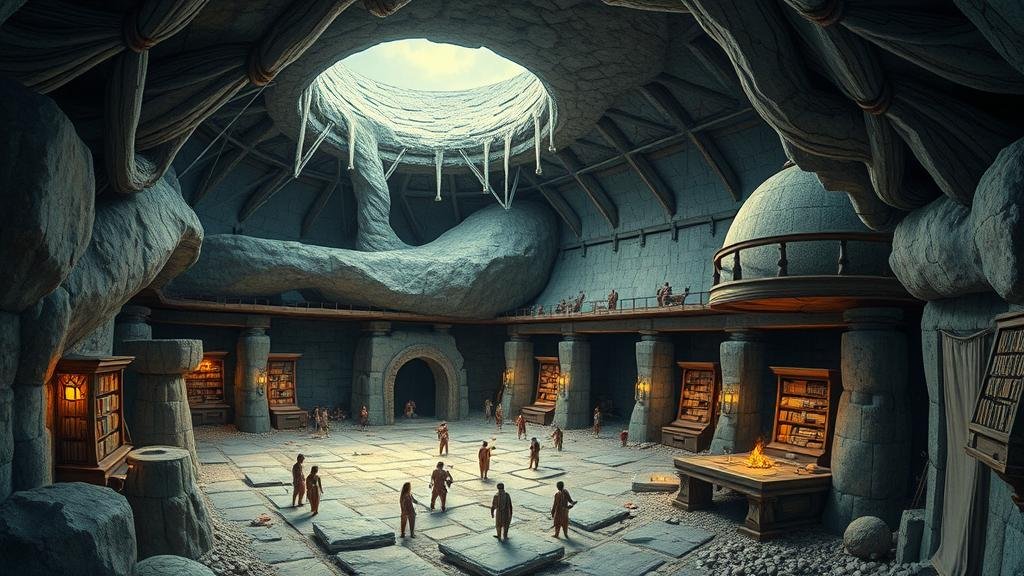Exploring the myths of subterranean libraries as repositories of ancient knowledge.
Exploring the Myths of Subterranean Libraries as Repositories of Ancient Knowledge
Throughout history, the notion of subterranean libraries has captivated the human imagination. These mythical archives, often depicted as hidden underground caverns filled with scrolls and ancient manuscripts, are frequently associated with lost civilizations and esoteric knowledge. Yet, how much truth lies behind these alluring tales? This article aims to dissect the myths surrounding subterranean libraries, examining their origins, the evidence for their existence, and their cultural significance.
The Legends of Subterranean Libraries
Many cultures across the globe have harbored legends of underground libraries. most famous of these is likely the Library of Alexandria, established in the 3rd century BCE in Egypt. While there are no verified accounts of an underground library there, the romanticized image of hidden scrolls protected from destruction deeply influenced later folklore.
Also to Alexandria, other myths include:
- The vast underground library supposedly hidden beneath the Temple of Solomon, as suggested in various religious texts.
- The secret libraries of the Assassins in the Nizari Ismaili sect, believed to safeguard knowledge from the outside world during the Middle Ages.
- Subterranean caverns within the ancient city of Rome, allegedly filled with forbidden texts.
Historical Context and Real-World Examples
Despite the allure of these legends, historical evidence for the existence of actual subterranean libraries remains scant. But, locations such as the Hypogeum of Ħal-Saflieni in Malta (built around 4000 BCE) and the extensive catacombs of Paris (initiated in the late 18th century) provide tangible examples of underground spaces that housed knowledge and cultural artifacts. Hypogeum served not only as a burial site but also held depictions of ancient rituals, hinting at their value as repositories of knowledge in a different form.
Another real-world analog is the archives of the Vatican, which while not subterranean, display a spiritual kind of secrecy and reserve for ancient documents whose access is highly restricted. The Vatican Secret Archives are said to house millions of documents accumulating over the centuries, accessible only to select scholars. This exclusivity echoes folkloric themes of hidden or esoteric knowledge in mythical libraries.
The Psychological Appeal of Hidden Knowledge
The idea of a subterranean library appeals to us for various psychological reasons. Knowledge is often perceived as power, and the concept of hidden knowledge plays into our desire to uncover secrets that have long been shrouded in mystery. This drive is prevalent in human history, evident in the following ways:
- Stories of ancient prophecies and texts believed to contain cosmic truths.
- The allure of alchemical texts that promise transformative secrets hidden from the masses.
This tendency to mythologize knowledge can be seen in modern times as well, such as in popular culture references like the movie National Treasure. This illustrates a broader phenomenon where the pursuit of knowledge is intertwined with adventure and discovery.
The Impact of Technological Advancements
In recent years, technological advancements have changed how we perceive knowledge repositories. Digitization has made vast quantities of historical texts accessible to anyone with an internet connection, diminishing the necessity for hidden libraries. Projects such as Google Books and the Internet Archive are modern-day equivalents of pushing back the walls of darkness that once obscured knowledge.
Plus, the rise of open-source platforms fosters collaboration and sharing of information, emphasizing transparency rather than secrecy. This paradigm shift might render the myths of subterranean libraries less relevant in a world where knowledge is increasingly democratized.
Conclusion: Myth or Reality?
To wrap up, while the myth of subterranean libraries as repositories of ancient knowledge is compelling, the historical reality appears more nuanced. Although actual subterranean libraries may not exist as described in legends, places of hidden knowledge do exist in various forms. intertwining of history, culture, and the human desire for discovery continues to fuel these myths, even in a modern context where information is readily available.
Actionable Takeaway: Explore historical sites and archives in your area, as they often hold fascinating stories that reflect our collective past. Engage with digital platforms that provide access to ancient texts and learn about the histories that have shaped our civilization.



